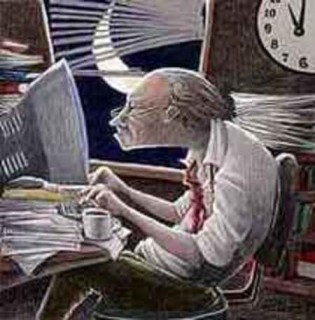Keep telling yourself excessive work hours are a noble endeavor
 When I was younger and dumber, I used to work 11 hour weekdays, half-day Saturdays, and was mentally distracted with work for much of the rest of time. Although I work for myself and have a ridiculously flexible of schedule, I vacationed very little at the time. I was seeking fortune and professional notoriety. I thought 60+ hour work weeks would get me there faster.
When I was younger and dumber, I used to work 11 hour weekdays, half-day Saturdays, and was mentally distracted with work for much of the rest of time. Although I work for myself and have a ridiculously flexible of schedule, I vacationed very little at the time. I was seeking fortune and professional notoriety. I thought 60+ hour work weeks would get me there faster.
It did’t. It made me counter-productive, short-sighted, and less money on a per hour basis. In fact, Henry Ford discovered this 100 years ago, according to Inc.
In the early 1900s, Ford Motor Company ran dozens of tests to discover the optimum work hours for worker productivity. They discovered that the “sweet spot” is 40 hours a week–and that, while adding another 20 hours provides a minor increase in productivity, that increase only lasts for three to four weeks, and then turns negative.
Unsurprisingly, most workaholics would react to Ford’s findings by thinking the rules don’t apply to them, that history won’t repeat itself, that times have changed, or that they’ll shun their bad habits later on because changing behavior is easy to do. Then they’ll continue repeating the same workaholic mistakes that Americans largely have since the ’80s, the same decade in which the term “work-life balance” was coined.
To that, I would collectively ask workaholics — both past and present — “How’s that working out for you?”
But that’s not a fair question since we already know the answer. Most devout workaholics die alone — either literally or figuratively with strained relationships — and in poor health, since they didn’t work on their bodies as much as they worked on their careers. Many of them die with regret, because they lived someone else’s dream instead of their own or deferred more important priorities until it was too late.
The good news is it’s never too late to become a recovering workaholic. The sooner the better. You just have to rethink your priorities. And learn from the past.
2 Comments
Never have, thanks for sharing. I’m blogging this! 🙂

Have you ever read this article? http://www.guardian.co.uk/lifeandstyle/2012/feb/01/top-five-regrets-of-the-dying